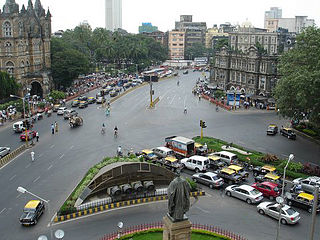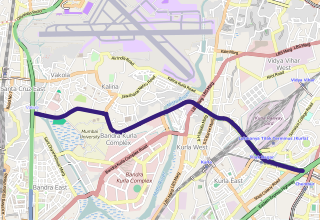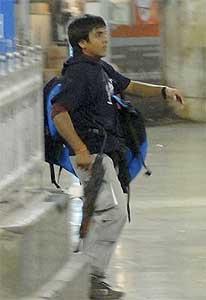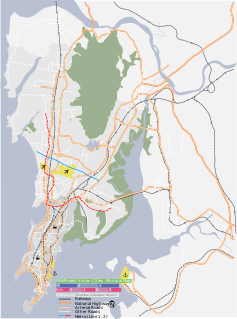Transport in India consists of transport by land, water and air. Public transport remains the primary mode of road transport for most Indian citizens, and India's public transport systems are among the most heavily used in the world.

Chhatrapati Shivaji Maharaj International Airport, Mumbai, formerly known as Sahar International Airport, is the primary international airport serving the Mumbai Metropolitan Area, India. It is the second busiest airport in the country in terms of total and international passenger traffic after Delhi, and was the 14th busiest airport in Asia and 28th busiest airport in the world by passenger traffic in calendar year 2017. Its passenger traffic was about 49.8 million in year 2018. The airport is the second busiest in the country in terms of cargo traffic also. In March 2017, the airport overtook London Gatwick Airport as the world's busiest airport with only one operational runway at a time. The airport has three operating terminals spread over a total land area of 750 hectares and handles about 950 aircraft movements per day. It handled a record 1,007 aircraft movements on 9 December 2018, higher than its earlier record of 1,003 flight movements in a day in June 2018. It handled a record 51 movements in one hour on 16 September 2014. Along with IGI Delhi, it was adjudged the "World's Best Airport" at Airport Service Quality Awards 2017 in the highest category of airports handling more than 40 million passengers annually by Airports Council International. It has also won the "Best Airport in India and Central Asia" award at the Skytrax 2016 World Airport Awards. It is one of the three airports in India to have implemented Airport Collaborative Decision Making (A-CDM) to ensure timely takeoffs and landings.

Public transport in Mumbai involves the transport of millions of its citizens by train, road, and water. Over 88% of the commuters in Mumbai use public transport. Mumbai has the largest organized bus transport network among major Indian cities.

The Mumbai Police is the police department of the city of Mumbai, Maharashtra. It is a part of Maharashtra Police and has the primary responsibilities of law enforcement and investigation within the limits of Mumbai. The force's motto is "Sadrakṣaṇāya Khalanigrahaṇāya".

Traffic police or traffic officers, often referred to colloquially as traffic cops, are police officers who direct traffic or serve in a traffic or roads policing unit enforcing rules of the road. Traffic police include officers who patrol major roads and also police who address traffic infractions on other roads. It has been noted that:
...traffic police, who are regarded as peripheral to most police forces, participate in both authoritative intervention and symbolic justice. Perhaps alone of all the assignments, traffic police are full-service police. They are different from the rest, however, because their work is limited to a particular venue — namely, public thoroughfares — and to particular people — namely, those who operate motor vehicles. But in terms of work, traffic police are detectives as well as patrol officers.

The Bandra–Worli Sea Link is a cable-stayed bridge with pre-stressed concrete-steel viaducts on either side that links Bandra in the Western Suburbs of Mumbai with Worli in South Mumbai. The bridge is a part of the proposed Western Freeway that will link the Western Suburbs to Nariman Point in Mumbai's main business district.
The Mumbai Urban Transport Project (MUTP), is a project formulated by the Mumbai Metropolitan Region Development Authority (MMRDA) to bring about improvement in the traffic and transport situation in the Mumbai metropolitan region with the assistance of the World Bank.

Madhur Bhandarkar is an Indian film director, script writer, and producer. He made his directorial debut with Trishakti and went on to direct several critically and commercially successful films.

The Santa Cruz–Chembur Link Road, shortened to SCLR, is a 6.45-kilometre-long (4.01 mi) arterial road in Mumbai, connecting the Western Express Highway (WEH) in Santa Cruz with the Eastern Express Highway (EEH) in Chembur. It contains the city's first and India's second double-decker flyover. The six-lane road was constructed as part of the World Bank-funded Mumbai Urban Transport Project (MUTP) at a cost of ₹454 crore (US$66 million). The World Bank withdrew funding midway through the project due to repeated delays, and the second phase was financed by the Mumbai Metropolitan Region Development Authority (MMRDA) with its own funds.

The Ministry of Shipping, a branch of the Government of India, is the apex body for formulation and administration of the rules and regulations and laws relating to shipping. Since 2014 it has been under Transport minister Nitin Gadkari.

Mohammed Ajmal Amir Kasab ; 13 July 1987 – 21 November 2012) was a Pakistani militant and a member of the Lashkar-e-Taiba Islamist militant organisation, through which he took part in the 2008 Mumbai terrorist attacks in Maharashtra state of India. Kasab, alongside fellow Lashkar-e-Taiba recruit Ismail Khan, killed 72 people during the attacks, most of them at the Chhatrapati Shivaji Terminus. Kasab was the only attacker captured alive by police.

Maharashtra Police is the law enforcement agency responsible for the Indian state of Maharashtra. It is headed by Director General of Police and headquartered in Mumbai, Maharashtra.

The Narcotics Control Bureau (NCB) is the nodal drug law enforcement and intelligence agency of India responsible for fighting drug trafficking and the abuse of illegal substances. The Director General of NCB is an officer of the Indian Police Service(IPS) or the Indian Revenue Service(IRS).
Challan is an official form or other kind of document, piece of paperwork, citation, etc. It is a way of crediting the money to one's bank account through a form, generally used in India and Pakistan as a receipt for payment or delivery.
The Eastern Freeway is a controlled-access highway, in Mumbai, that connects P D'Mello Road in South Mumbai to the Eastern Express Highway (EEH) at Chembur. It is 16.8 km long and its estimated cost is ₹1,436 crore (US$210 million). The Eastern Freeway was built by the Mumbai Metropolitan Region Development Authority (MMRDA) and funded by the Central Government through the Jawaharlal Nehru National Urban Renewal Mission (JnNURM). Construction was contracted to Simplex Infrastructure Ltd. A 13.59 km stretch of the freeway, comprising two of three segments with one of the twin tunnels, from Orange Gate on P D'Mello Road up to Panjarpol, near RK Studios in Chembur, was opened to the public on 14 June 2013. The second tunnel was opened on 12 April 2014. The third and final segment from Panjarpol to Ghatkopar-Mankhurd Link Road (GMLR) was opened on 16 June 2014.
Swargate Bus Station consists of two adjacent bus stations in Pune, operated by the Maharashtra State Road Transport Corporation (MSRTC) and the Pune Mahanagar Parivahan Mahamandal Limited (PMPML). It is located in the locality of Swargate in Pune, opposite the Swargate Police Station.
Dawood Ibrahim Kaskar is a Mumbai underworld, terrorist, criminal mobster and drug dealer most wanted by India with a reward of $25 million over his head. He is originally from Dongri in Mumbai, India.

Traffline is a website and mobile app that provides real time traffic information in 5 cities in India, Mumbai, Delhi NCR, Hyderabad, Bangalore, Kolkata, Chennai and Pune. Developed by Mumbai-based start-up Birds Eye Systems Pvt Ltd it was launched in 2012 by co-founders Brijraj Vaghani and Ravi Khemani. Apart from web and mobile, Traffline also provides Traffic updates via SMS, email, social media and call center.
The Aqua Line of the Mumbai Metro, also known as Line 3 or the Colaba–Bandra-SEEPZ line, is a part of the metro system for the city of Mumbai, India of which construction has been initiated. When completed, the 33.5-km long line will be the first underground metro line in Mumbai. The metro line will connect Cuffe Parade business district in the extreme south of the city to SEEPZ in the north-central with 26 underground and one at-grade station. The track width is standard gauge. The cost of this corridor is estimated at ₹30,000 crore (US$4.3 billion). Line 3 is expected to reduce road congestion, besides reducing the load on the Western Line between Bandra and Churchgate.














